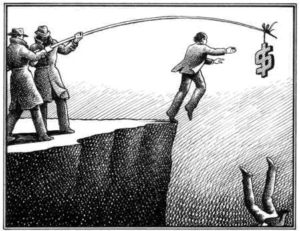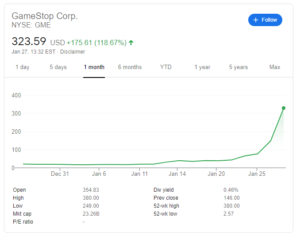By Doug McConnell
Stock markets don’t run purely on a principle of ‘buyer beware’. Market manipulation is illegal and takes informational and transactional forms. A “pump and dump”, for example, is an informational manipulation where one establishes a position, spreads misinformation about how successful the company will be (possibly including selling stock to others), and then sells everything once the stock has increased in price. Everyone else is then left holding the overvalued stock.
The initial motivation to invest in GME was, apparently, based on the judgment (see here and here) that GameStop was undervalued so the short sellers had made a mistake. Then a group of retail investors in an online reddit forum WallStreetBets realised that there was an opportunity for a short squeeze (details here). If enough of them bought stock they would increase its price enough to ‘squeeze’ the short sellers into rebuying their stock to cut their losses. This adds fuel to the fire, further pushing up the stock price and tightening the squeeze for any remaining short sellers. GME was fertile ground for a short squeeze because a high proportion of stock had been shorted – i.e. there was a lot of potential fuel to add to the fire.
A complication with transactional manipulation is that any large purchase or sale of stock affects that stock’s value, especially for relatively small companies. Therefore, to be illegal, a transaction that influences the price of a stock also has to be intended to manipulate the price.
As word got around the internet, more retail investors piled in seeing the opportunity to hurt hedge funds and/or make money from the expected boost in stock prices form short sellers buying their stock back. Of course, nearly everyone understood that this was risky speculation; the fundamentals of GameStop as a company remained the same so it was very likely that the stock was now well-overvalued (despite some believing its real value is surprisingly high). At some stage the price will correct leaving the speculators scrambling to get out with what they can.
The company at the centre of this drama is GameStop, a computer game and console retailer with brick and mortar stores. In a familiar story for many retailers, it has come under pressure in recent times because people can order games to be delivered or simply download them; the pandemic keeping people at home hasn’t helped either. A number of hedge funds predicted that GameStop’s stock (GME) price didn’t properly reflect the real trouble the company was in. The stock appeared overvalued making it a good candidate for short selling.
As the Securities and Exchange Commission states, however, “a scheme to manipulate the price or availability of stock in order to cause a short squeeze is illegal.” Speaking about the GME short squeeze, Dr Elvis Jarnecic, senior lecturer at the University of Sydney Business School, claims that, “if institutions did this to inflate prices … away from fundamental values they’d receive enormous fines in regards to manipulating the market.”
In summary, if one needs both the intention and the means to be guilty of manipulating the market, it might be difficult to find a guilty party among the retail investors.
One option is to just accept that sometimes people will get away with orchestrating short squeezes and that this is an unavoidable contributor to market volatility. Given the rising influence of vindictive, righteously indignant, or otherwise economically ‘irrational’ retail investors the phenomenon and associated volatility might be on the increase. If so, short positions are becoming riskier than they were in the past but investors can factor in. Some might see this as a useful dampener on short selling.
These rules have an ethical basis. Misinformation undermines trust which discourages investment and undermines cooperative enterprise. Society is better when we can cooperate so there is an ethical reason to limit misinformation (i.e. to limit freedom of speech). Without restrictions on transactional manipulations the biggest players can take advantage of their size to control prices to their advantage (and to the disadvantage of smaller investors). In the interests of a fair playing field for investors regardless of their size limits are placed on freedom of investment. There might also be an ethical reason to prevent trading that causes large over or undervaluation of stocks if we agree that we would prefer a less volatile, less risky stock market to invest in.
Did the retail investors buying GME engage in the same kind of unethical transactional manipulation? This depends on whether these investors intended to manipulate the market and whether they had the power to do so. The intentions of many of those who came to invest in GME cannot be known. Some investment in GME was, initially based on a judgment that the short sellers had underestimated its value. Others saw a stock going up and jumped on the bandwagon, yet others were just in it to hurt a hedge fund. Only some of the retail investors made their intention to manipulate the price of GME public in online forums. So, if any of the retail investors are guilty of manipulating the market, it seems likely to be people in that subset.
A second option is to ban short selling to eliminate the conditions for short squeezes, orchestrated or otherwise. In fact, short selling has been banned on occasion because it can exacerbate a market crash. The Securities and Exchange Commission banned short selling in 2008 to try and stabilise dramatic market losses. But short selling itself is not generally considered a bad thing and isn’t necessarily an attempt to undermine a company. It is seen as a good way to make the market more responsive to the true value of companies – if a stock is perceived to be overvalued, its value will correct more efficiently if people can bet against it. The benefits of short selling are generally thought to outweigh its downsides but perhaps that will change in response to investor behaviour.
Perhaps some ringleaders could still be held responsible because they incited a mob with the collective power to manipulate the market? This isn’t very plausible, however. The call to invest in GME isn’t exactly like shouting ‘fire’ in a crowded cinema – a crowd can be reasonably expected to panic upon hearing ‘fire’ in an enclosed space but it’s hard to believe a suggestion to ‘invest!’ could undermine others’ autonomy.
If one thinks that there are institutional investors who need to be punished for their past behaviour (the 2008 crash etc), the GME short squeeze managed to make a couple of hedge funds pay. It’s not clear that this was proportional to what they deserved and it seems more likely that they just happened to be in the firing line. Nevertheless, for people who think Wall Street is due some punishment, it’s probably seen as a good start.
Recently a large, loosely coordinated group of individual ‘retail investors’ have been buying up stocks that certain hedge funds had bet against (i.e. ‘shorted’). In doing so, the retail investors have driven up the price of those stocks. This has caused hedge funds that shorted the stock to lose billions of dollars and enabled a number of retail investors to get rich in the process. The phenomenon is anthropologically interesting because it is symbolic of a shift in power away from the traditional Wall Street players towards less wealthy, less well-connected individuals. But what are the ethics of this? Did Average Joe Trader just bring a measure of justice to Wall Street? Or did the mob unethically manipulate the market? If they did, are their actions any more unethical than the usual behaviour of institutional investors?
For the purposes of comparison, imagine an institution that, like some of the retail investors, publicly declares its intention to trigger the GME short squeeze. As an institutional investor it has a relatively centralised decision-making system and that decision-making system controls the transactions the company makes. Therefore, it acts out its intention, because it has a huge amount of money, succeeds in single-handedly manipulating the market. This is clearly illegal as Jarnecic claims.
A more plausible possibility is that enough intentional manipulators colluded so that collectively they had the power to change the price. But what was the extent of collusion here? Suggesting to others on an online forum that they should invest in GME doesn’t appear a particularly strong form of collusion. If a group of intentional manipulators pooled their money and initiated the short squeeze as a group then, at that point, they look very much like the guilty institutional investor above. However, I doubt that such strong collusion took place.
There are however a range of disanalogies between an institution doing this and a group of retail investors doing it.
A third option might be to dispense with working out an investor’s intentions and simply prevent trades that meet agreed criteria for ‘appearing’ manipulative. This is well outside my expertise, but I suspect the difficulty in creating such rules is that they will tend to have unintended and unwelcome side effects.
Given the difficulties in working out whether retail investors or institutions are responsible for orchestrating short squeezes, what might we do?
A classic form of transactional manipulation is “painting the tape” where a colluding group of investors sell a stock among themselves to artificia
Returning to institutional investors, it seems pretty unlikely that they would generally be caught for orchestrating a squeeze. In our example above we imagined that the institution publicly stated an intention to manipulate the market; in reality this wouldn’t happen. Investors don’t have to declare their real intentions and they could hide behind the lie that the investment was based on a judgment that there was real value in the company.
In the GameStop case, the retail investors weren’t spreading deceptive information about the company value. If this is an example of market manipulation it is manipulation through transaction – deliberately pushing up the price of a stock well beyond its true value. A short squeeze doesn’t necessarily involve manipulation – it can also happen when the prospects of a company with heavily shorted stock unexpectedly improve. In that case investors motivated by what they believe to be genuine value buy the stock. Initially the increasing stock price might track a realistic assessment of the company’s new value bu
But did any of those with the intention to manipulate the price also have enough money to significantly increase the price? If so, those individuals may well be in trouble, however, very few, if any, would have had enough money to change the price much.
Finally, is there some sense in which justice was served by those who orchestrated the GME short squeeze? Well, perhaps in a highly imperfect sense. If one believes that the world’s wealth should be distributed more equally, the GME short squeeze made a very small improvement by transferring wealth from the (mainly) very wealthy to the (mainly) slightly less wealthy. But overall it didn’t get much wealth to the many people who need it the most. One also has to be prepared to overlook the fact that the redistribution depended, in part, on wrongful market manipulation.
Was this an illegal or unethical market manipulation which wronged the short selling hedge funds? Or is it just a case of caveat emptor; the hedge funds got beaten at their own game?
Short selling a stock is where you temporarily borrow a company’s stock and immediately sell it (say for £1). The short seller then waits for the price of the stock to go down. When they think it has gone about as low as its going to go, they buy it back. At the end of the agreed borrowing time the short seller is obliged to return the stock it borrowed. If the stock went down in price (say to 70p), they make the difference (30p) but, if the stock goes up over that time, they lose the difference. The maximum one could make is if the stock becomes virtually w



